(2021.06.24) [Korea herald] Founder of Sunfull campaign proposes ‘vaccine’ of positive comments agai
관리자
2021.08.30 15:18:46 · 조회:6231
(2021.06.24) [Korea herald] Founder of Sunfull campaign proposes ‘vaccine’ of positive comments against cyberbullying
http://www.koreaherald.com/view.php?ud=20210624000725&ACE_SEARCH=1
[Herald Interview] Founder of Sunfull campaign proposes ‘vaccine’ of positive comments against cyberbullying
Min Byoung-chul encourages people to recognize root causes of cyberbullying, take action in pandemic era
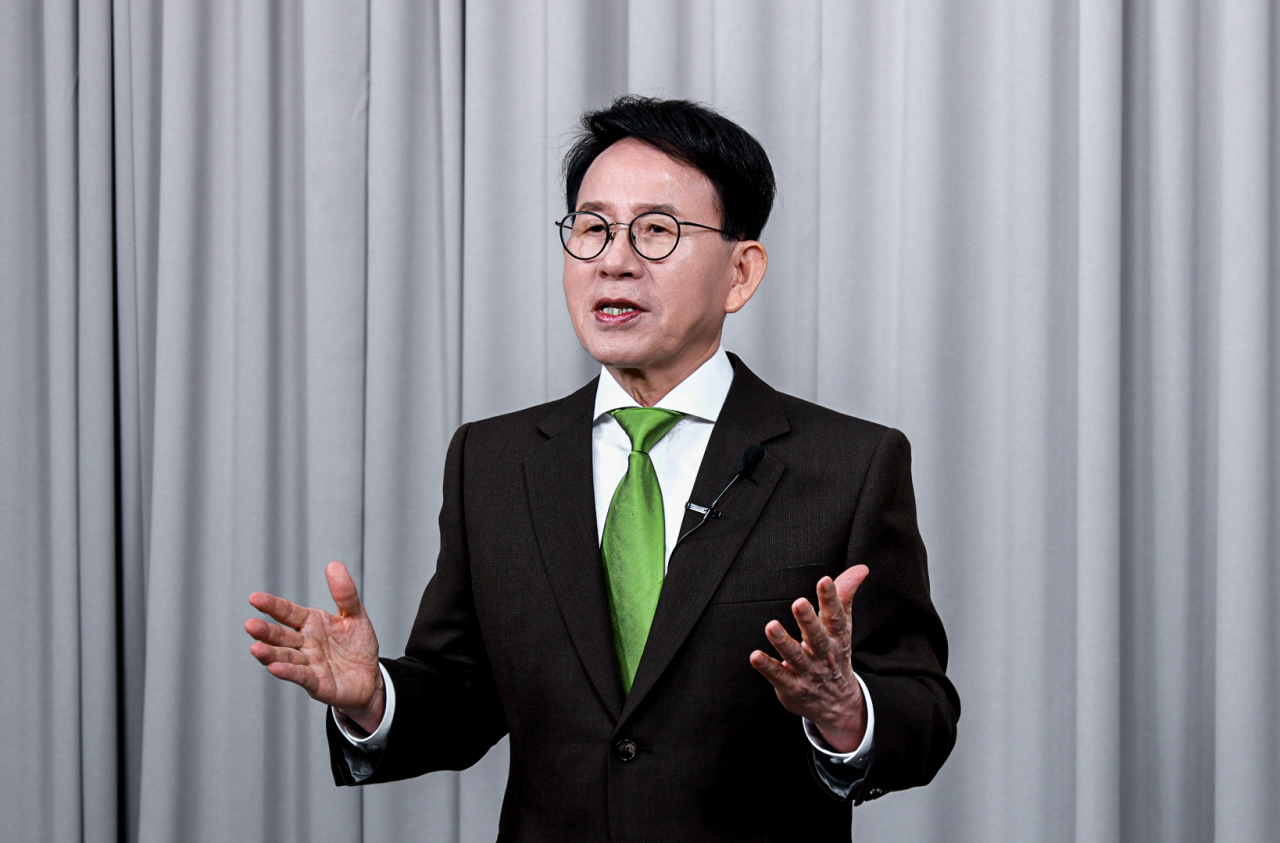 |
Min Byoung-chul, founder of the Sunfull Internet Peace Movement and an endowed-chair professor at Chung-Ang University, is scheduled to present his ideas regarding cyberbullying at the Asian Leadership Conference slated for July 1. (Sunfull Foundation) |
As more people stay home and get connected in cyberspace during the COVID-19 pandemic period, the volume of hateful online comments has gone up. Min Byoung-chul, who has been at the forefront of battling cyberbullying, said that it is time to recognize its root causes and take action to prevent such malicious comments on the internet.
“Cyberbullying has been on the rise after the COVID-19 pandemic arrived, and we should identify the underlying reason why people are engaged in such destructive behaviors on social media and come up with fundamental solutions,” Min said in a recent interview with The Korea Herald.
Min, founder of the Sunfull Internet Peace Movement and an endowed-chair professor at the College of Business at Chung-Ang University, is scheduled to present his ideas regarding cyberbullying at the Asian Leadership Conference slated for July 1 in a speech titled “A Vaccine Against Cyberbullying in Post-pandemic Era -- Sunfull Movement.”
As the speech title suggests, Min is putting the spread of hateful comments in cyberspace in parallel with the COVID-19 pandemic. The analogy is also applied to the anti-cyberbullying campaign he leads and the real vaccine against the coronavirus.
“Cyberbullying has been on the rise after the COVID-19 pandemic arrived, and we should identify the underlying reason why people are engaged in such destructive behaviors on social media and come up with fundamental solutions,” Min said in a recent interview with The Korea Herald.
Min, founder of the Sunfull Internet Peace Movement and an endowed-chair professor at the College of Business at Chung-Ang University, is scheduled to present his ideas regarding cyberbullying at the Asian Leadership Conference slated for July 1 in a speech titled “A Vaccine Against Cyberbullying in Post-pandemic Era -- Sunfull Movement.”
As the speech title suggests, Min is putting the spread of hateful comments in cyberspace in parallel with the COVID-19 pandemic. The analogy is also applied to the anti-cyberbullying campaign he leads and the real vaccine against the coronavirus.
 |
The Sunfull Foundation led by Min Byoung-chul carries out a variety of anti-cyberbullying campaigns and events both at home and abroad. (Sunfull Foundation) |
It was in 2007 that Min started the Sunfull Internet Peace Movement in response to the growing problem of cyberbullying, online hate speech and human rights abuses that have claimed the lives of many people, including schoolchildren and K-pop stars.
Min is now widely known as the key figure behind the Sunfull Internet Peace Movement, but he is also a renowned author of a number of books and publications, including the bestseller “BCM Practical English.” Min is a pioneer in promoting practical English education, and many Koreans still remember his English lectures on a major TV station decades ago.
As an educator, Min is in charge of a university course, “Business Creativity: Bringing Your Ideas to Reality,” a program now in its 11th year that prepares students to discover their passion early in their careers and learn how to start their own business from the ground up.
In 2018, Min established the Internet Peace Prize to recognize and award those who contribute to peace on the internet.
The following is the excerpt of the interview with Min.
Min is now widely known as the key figure behind the Sunfull Internet Peace Movement, but he is also a renowned author of a number of books and publications, including the bestseller “BCM Practical English.” Min is a pioneer in promoting practical English education, and many Koreans still remember his English lectures on a major TV station decades ago.
As an educator, Min is in charge of a university course, “Business Creativity: Bringing Your Ideas to Reality,” a program now in its 11th year that prepares students to discover their passion early in their careers and learn how to start their own business from the ground up.
In 2018, Min established the Internet Peace Prize to recognize and award those who contribute to peace on the internet.
The following is the excerpt of the interview with Min.
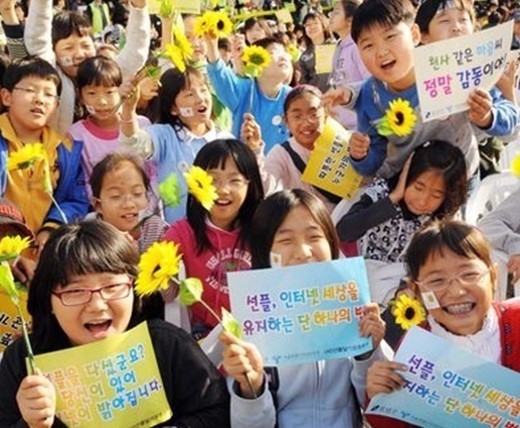 |
(Sunfull Foundation) |
Q: Can you introduce what the Sunfull Internet Peace Movement is and why it is important to introduce this in the COVID-19 era?
A: Sunfull Internet Peace Movement encourages everyone to post positive comments online, especially adolescents as part of their school activities and company workers as part of ESG (environmental, social and governance) programs.
The pandemic has advanced technologies that enable us to connect to people all over the world online. Because the virus restricts us from venturing outside to meet people, teenagers are taking advantage of these technologies that enable them to interact with people online more easily and frequently. But this sort of digitization is a double-edged sword. And most importantly, there are no specific regulations against cyberbullying. This, coupled with the anonymity of online interactions, has made cyberbullying a serious problem in this pandemic.
Q: What prompted you to establish the Sunfull Movement?
A: Back in 2007, I learned that a Korean celebrity was driven to take her own life because of malicious comments directed at her on the internet. The idea that malicious comments could end a life like that shocked me. My heart was in pain, and I knew I couldn’t stand by and do nothing. So, I gave my students an assignment to post positive comments on 10 different celebrity websites that were suffering from hateful comments. Within a week, 5,700 uplifting comments were posted. You could say this was the very first Sunfull campaign that started it all.
A: Sunfull Internet Peace Movement encourages everyone to post positive comments online, especially adolescents as part of their school activities and company workers as part of ESG (environmental, social and governance) programs.
The pandemic has advanced technologies that enable us to connect to people all over the world online. Because the virus restricts us from venturing outside to meet people, teenagers are taking advantage of these technologies that enable them to interact with people online more easily and frequently. But this sort of digitization is a double-edged sword. And most importantly, there are no specific regulations against cyberbullying. This, coupled with the anonymity of online interactions, has made cyberbullying a serious problem in this pandemic.
Q: What prompted you to establish the Sunfull Movement?
A: Back in 2007, I learned that a Korean celebrity was driven to take her own life because of malicious comments directed at her on the internet. The idea that malicious comments could end a life like that shocked me. My heart was in pain, and I knew I couldn’t stand by and do nothing. So, I gave my students an assignment to post positive comments on 10 different celebrity websites that were suffering from hateful comments. Within a week, 5,700 uplifting comments were posted. You could say this was the very first Sunfull campaign that started it all.
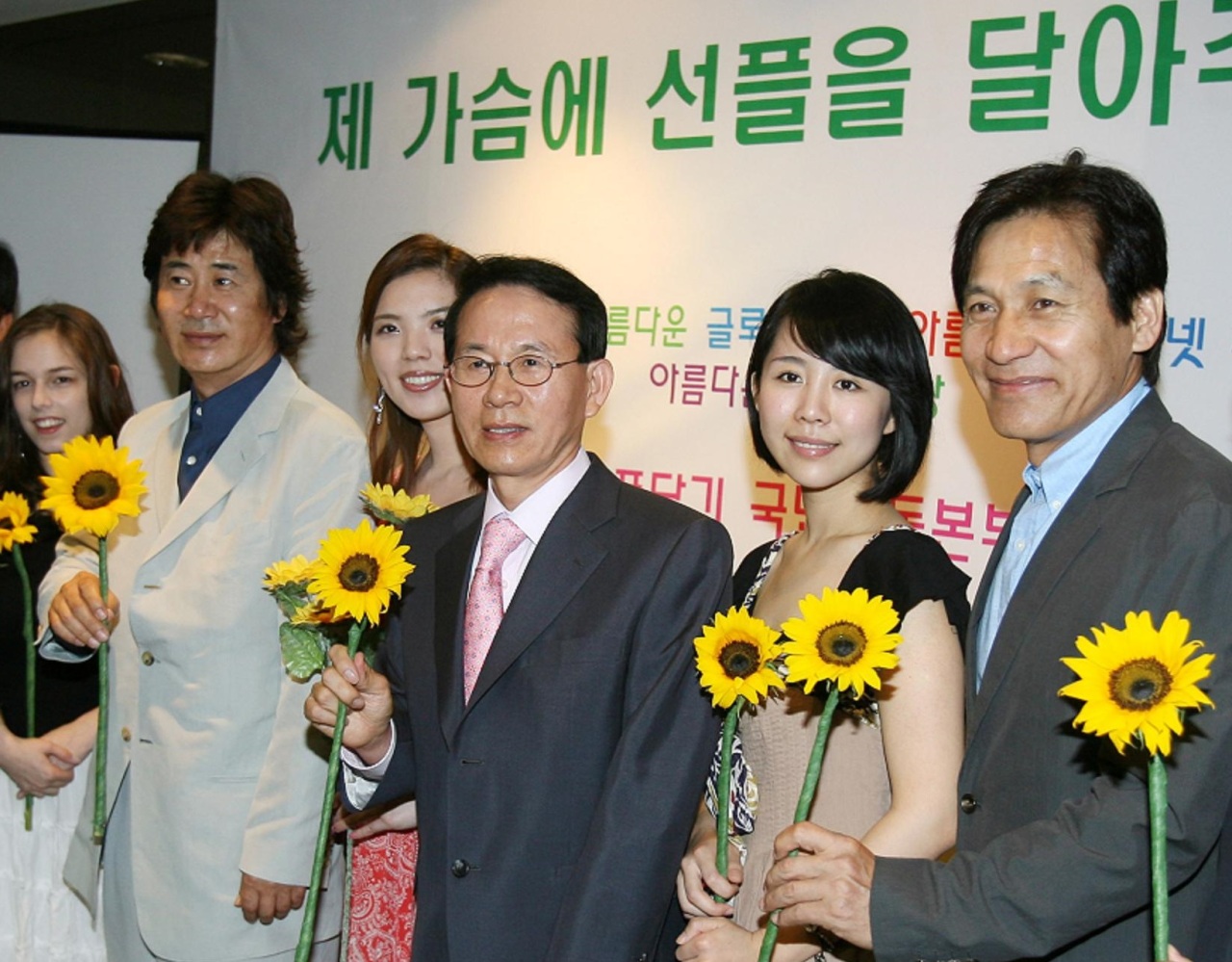 |
(Sunfull Foundation) |
Q: Why do you think more teenagers are vulnerable to harsh comments on the internet in this pandemic period?
A: Cyberbullying is a serious problem, and particularly vulnerable people are school-age children. It is estimated that about 60 percent of teenagers across the world experience cyberbullying on a daily basis.
This pandemic has increased the number of cyberbullying cases. In Korea alone, according to the Blue Tree Foundation Survey, cyberbullying increased three times from 5.3 percent in 2019 to 16.3 percent last year. Because of this pandemic, more and more people are connecting online all over the world every day. But digitization brings the dark space on the internet along with it.
Q: What is the current status of cyberbullying?
A: Cyberbullying is a serious problem that has taken the lives of precious people, especially young people. Just one example is the story of a 12-year-old girl in New Jersey. Her classmates bullied her and excluded her from school activities, sending hateful messages for months on end until the poor little girl couldn’t take it anymore. She ended up taking her own life.
This is just the tip of the iceberg. People are being hurt by malicious comments every moment of the day. There are so many cases like these we are not even aware of. But we can fight this by helping people realize how dangerous malicious comments can be and show that positive comments can encourage people and even save people’s lives.
A: Cyberbullying is a serious problem, and particularly vulnerable people are school-age children. It is estimated that about 60 percent of teenagers across the world experience cyberbullying on a daily basis.
This pandemic has increased the number of cyberbullying cases. In Korea alone, according to the Blue Tree Foundation Survey, cyberbullying increased three times from 5.3 percent in 2019 to 16.3 percent last year. Because of this pandemic, more and more people are connecting online all over the world every day. But digitization brings the dark space on the internet along with it.
Q: What is the current status of cyberbullying?
A: Cyberbullying is a serious problem that has taken the lives of precious people, especially young people. Just one example is the story of a 12-year-old girl in New Jersey. Her classmates bullied her and excluded her from school activities, sending hateful messages for months on end until the poor little girl couldn’t take it anymore. She ended up taking her own life.
This is just the tip of the iceberg. People are being hurt by malicious comments every moment of the day. There are so many cases like these we are not even aware of. But we can fight this by helping people realize how dangerous malicious comments can be and show that positive comments can encourage people and even save people’s lives.
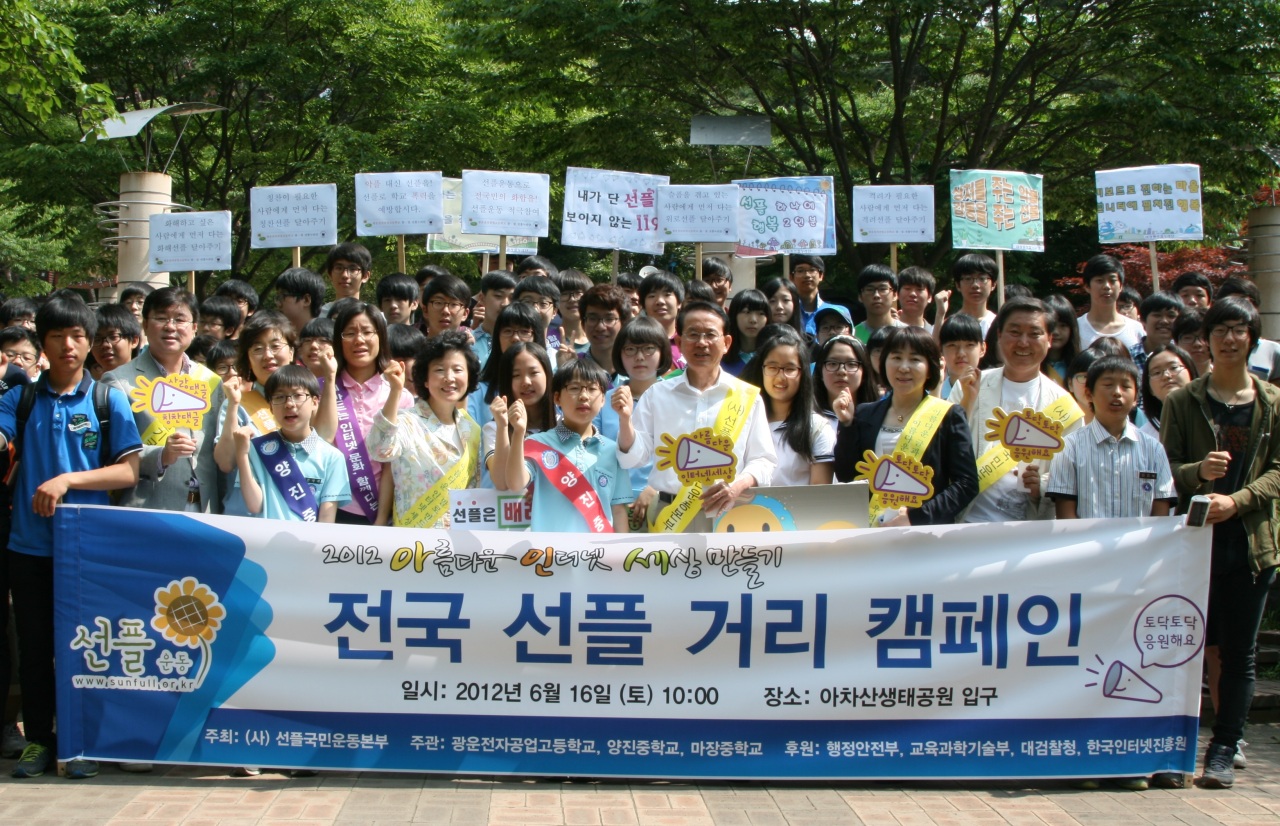 |
(Sunfull Foundation) |
Q: Why are there so many malicious comments on the internet?
A: According to researchers, bullies have an inferiority complex and are unhappy with their own lives. Also, the anonymity on the internet allows people to be hateful to others. However, I truly believe if we go down to the root causes of the problem that is like bullying and name calling, we can change the behavior and mindset of netizens and make the internet a better place.
Q: Why do you say that cyberbullying is a pandemic? Do we have a vaccine for this pandemic yet?
A: A virus becomes a pandemic when it starts to spread uncontrollably across the world. Cyberbullying is showing the same characteristics. In countering cyberbullying for 14 years, I have found that many of the bullies were actually victims who didn’t get justice or advice. According to a survey on cyberviolence, 92.4 percent of cyberbullying perpetrators say that they have experienced cyberbullying in the past. This cycle of victims becoming a bullies is just like a virus. If left unattended, it will spread uncontrollably and endanger the internet. Thankfully, we’ve found the vaccine and it’s called the Sunfull Internet Peace Movement.
A: According to researchers, bullies have an inferiority complex and are unhappy with their own lives. Also, the anonymity on the internet allows people to be hateful to others. However, I truly believe if we go down to the root causes of the problem that is like bullying and name calling, we can change the behavior and mindset of netizens and make the internet a better place.
Q: Why do you say that cyberbullying is a pandemic? Do we have a vaccine for this pandemic yet?
A: A virus becomes a pandemic when it starts to spread uncontrollably across the world. Cyberbullying is showing the same characteristics. In countering cyberbullying for 14 years, I have found that many of the bullies were actually victims who didn’t get justice or advice. According to a survey on cyberviolence, 92.4 percent of cyberbullying perpetrators say that they have experienced cyberbullying in the past. This cycle of victims becoming a bullies is just like a virus. If left unattended, it will spread uncontrollably and endanger the internet. Thankfully, we’ve found the vaccine and it’s called the Sunfull Internet Peace Movement.
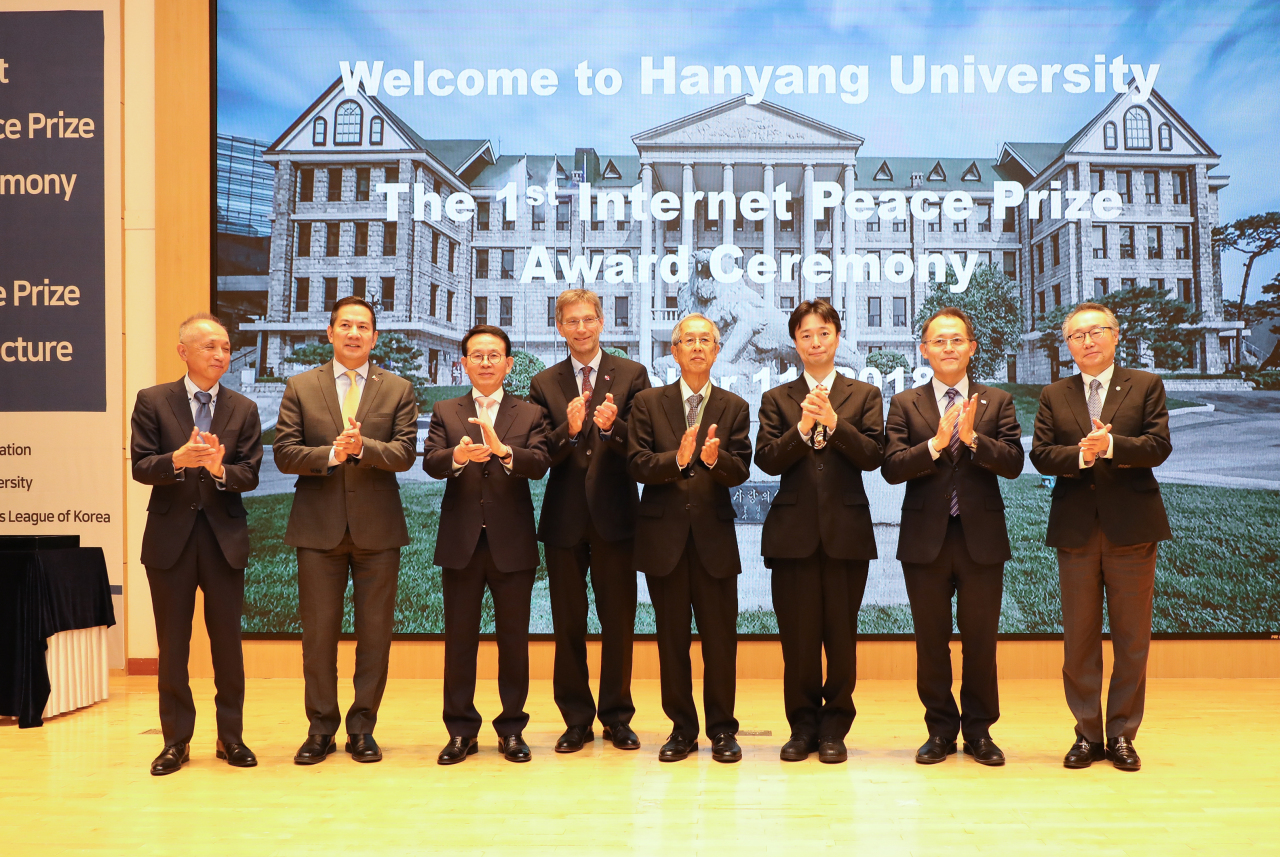 |
(Sunfull Foundation) |
Q: What is your vision for the globalization of the Sunfull Internet Peace Movement?
A: Our vision at Sunfull is to reach 1.8 billion young people from all around the world and educate them at an early age. Children who are taught to pick up litter at a young age are less likely to litter themselves when they grow up. Similarly, if we can teach our kids the effects of malicious comments at a young age, they are less likely to hurt others when they grow up.
Currently, we are developing the Sunfull App, an educational app that provides support not only for victims but also for bullies. We all know that bullies are made, not born, and our mission is to change their mindset and help them become better netizens.
By Yang Sung-jin (insight@heraldcorp.com)
A: Our vision at Sunfull is to reach 1.8 billion young people from all around the world and educate them at an early age. Children who are taught to pick up litter at a young age are less likely to litter themselves when they grow up. Similarly, if we can teach our kids the effects of malicious comments at a young age, they are less likely to hurt others when they grow up.
Currently, we are developing the Sunfull App, an educational app that provides support not only for victims but also for bullies. We all know that bullies are made, not born, and our mission is to change their mindset and help them become better netizens.
By Yang Sung-jin (insight@heraldcorp.com)

